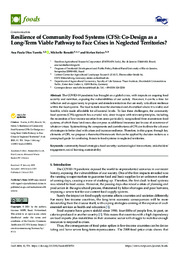Resilience of community food systems (CFS): co-design as a long-term viable pathway to face crises in neglected territories?
Resilience of community food systems (CFS): co-design as a long-term viable pathway to face crises in neglected territories?
Author(s): TURETTA, A. P. D.; BONATTI, M.; SIEBER, S.
Summary: The COVID-19 pandemic has brought on a global crisis, with impacts an ongoing food security and nutrition, exposing the vulnerabilities of our society. However, it can be a time for reflection and an opportunity to propose and stimulate initiatives that are ready to facilitate resilience within the food system. The food to fork must be shortened and diversified where it is viable and feasible, while made affordable for all societal levels. To face these challengers, the community food systems (CFS) approach has a crucial role, since it copes with relevant principles, including the necessities of low-income societies from areas particularly marginalized from mainstream food systems, of which those land areas also can pose as additional insurance just in case of occurrence of whatever crises. Systematizing the components and contributions of CFS can facilitate the advance of strategies to better deal with crises and increase resilience. Therefore, in this paper, through key elements of CFS, we propose a theoretical framework that can be applied by decision makers as a conceptual guide for combating threats to food systems in neglected territories.
Publication year: 2021
Types of publication: Journal article
Unit: Embrapa Soils
Observation
Some of Embrapa's publications are published as ePub files. To read them, use or download one of the following free software options to your computer or mobile device. Android: Google Play Books; IOS: iBooks; Windows and Linux: Calibre.
Access other publications
Access the Agricultural Research Database (BDPA) to consult Embrapa's full library collection and records.
Visit Embrapa Bookstore to purchase books and other publications sold by Embrapa.

